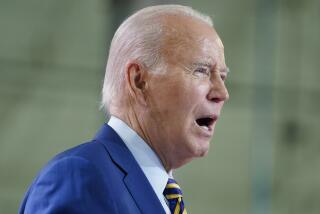‘Hard decisions’ give Medicare a trim
WASHINGTON — The budget President Bush proposed Monday calls for the deepest Medicare cuts of his six years in office and falls short in expanding health coverage to uninsured children -- a top priority for congressional Democrats this year.
Health and Human Services Secretary Mike Leavitt acknowledged the budget’s austere tone, but said action was needed to rein in programs growing at an unsustainable pace.
“A very clear priority of the budget has been to reach balance in 2012,” he told reporters Monday, “and that has forced many of the hard decisions.”
Consumer and industry groups -- including AARP, the American Medical Assn., the American Cancer Society, the Alzheimer’s Assn. and the California Hospital Assn. -- roundly criticized Bush’s plan, and their opposition signaled that it was unlikely to gain traction.
Rep. Pete Stark (D-Fremont), chairman of the House Ways and Means subcommittee on health, dismissed the budget as “an exercise in make-believe intended to incite partisanship, not invite policymaking.”
Separately, Bush’s proposed tax deduction of up to $15,000 for health insurance ran into more problems after an independent analysis concluded that most of the tax break would go to higher-income households that already have private insurance.
Bush had outlined the plan last month in his State of the Union message. But a study by the Lewin Group, a healthcare consulting firm, found that only about 21% of the tax breaks would go to families with at least one uninsured member. A little more than half the benefit would go to families earning $75,000 or more.
“The money is not being targeted at those who are most in need of it,” said John Sheils, a Lewin vice president.
The budget’s curbs on Medicare spending included reductions in payments to hospitals, nursing homes, hospice programs, home health providers and ambulance companies. Also, upper-income beneficiaries would have to pay higher premiums for prescription coverage and doctors’ services.
But the proposal left Medicare managed-care plans largely alone, to the chagrin of Democrats who see the private plans as undermining the traditional government program.
The Medicare cuts -- described by a Health and Human Services budget official as the biggest Bush has ever proposed -- would total nearly $66 billion over five years. Administrative and anti-fraud measures would save an additional $10 billion. Taken together, the proposals would slow the rate of increase in Medicare spending by about 1 percentage point between 2008 and 2012, to 5.6%.
The department estimated that Medicare spending for 2008 would total $454 billion and benefit 44.6 million people.
Bush also called for almost $26 billion in cuts for Medicaid, which provides healthcare for the poor, over the same period.
Some congressional Republicans expressed misgivings. “These are alarming proposals to our healthcare system, and many have already been denied by Congress,” said Sen. Gordon H. Smith (R-Ore.).
Sen. Michael B. Enzi of Wyoming, the ranking Republican on the Health, Education, Labor and Pensions Committee, stopped short of criticizing the budget, but noted: “At the end of the day, the House and Senate control the purse strings ... [and] the final document may look very different from the president’s proposals.”
On children’s insurance, Bush proposed to renew the politically popular State Children’s Health Insurance Program, which is set to expire this year. The federal-state program provides coverage to as many as 6 million children whose parents make too much to qualify for Medicaid, but too little to afford private insurance.
Democrats estimate it will take as much as $15 billion in additional spending over five years just to maintain the current caseload, but Bush proposed only about $5 billion. Administration officials said their calculations show no children would lose coverage, but advocates for the poor were highly skeptical of such assurances.
Even if Bush’s healthcare budget is unlikely to survive as a whole, Democrats may resurrect parts of it to help pay for their own priorities -- such as an expansion of coverage for children.
“This is like a menu of issues on the table,” said David Certner, a top lobbyist for AARP. “These are much larger cuts than Congress would entertain, but members may pick and choose among them as they put together their own proposals.”
*
ricardo.alonso-zaldivar@latimes.com
More to Read
Get the L.A. Times Politics newsletter
Deeply reported insights into legislation, politics and policy from Sacramento, Washington and beyond. In your inbox three times per week.
You may occasionally receive promotional content from the Los Angeles Times.










